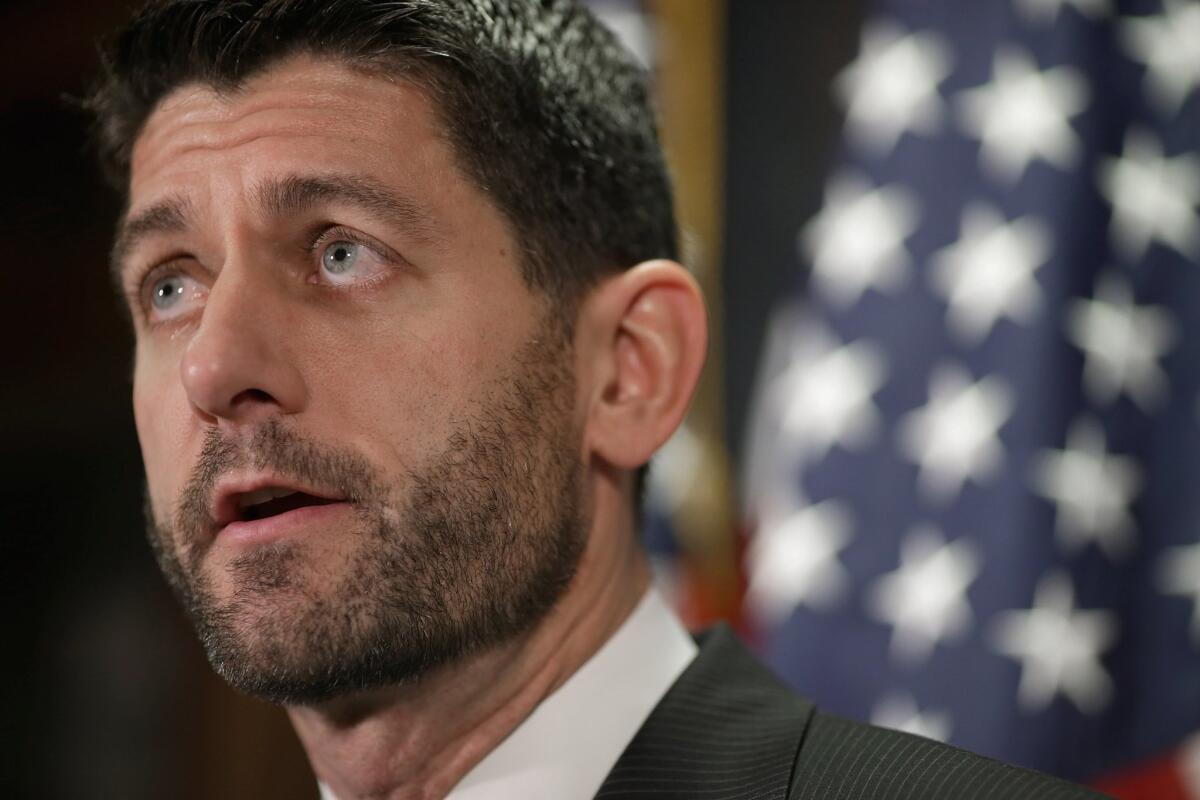In rare bipartisan vote, House passes visa-waiver bill to beef up travel restrictions

Speaker of the House Paul Ryan at the U.S. Capitol on Dec. 8 in Washington, DC.
- Share via
In the aftermath of terrorist attacks in San Bernardino and Paris, the House moved Tuesday to restrict travel to the U.S. by passing a bill that would end visa-free entry to those who have visited Syria, Iraq, Iran or Sudan.
The legislation, shaped in part by the White House, won widespread support from both parties despite objections by some that it is not tough enough, and by others that it will impose hardships on ordinary citizens of foreign allies.
Passage on a vote of 407 to 19 emerged as one area of agreement between President Obama and Republicans in the fight against Islamic State terrorism.
SIGN UP for the free Essential Politics newsletter >>
But it was was largely overshadowed by GOP presidential front-runner Donald Trump’s proposal to ban all Muslims from entering the U.S.
Responding to Trump’s comments, House Speaker Paul D. Ryan (R-Wis.) emphasized Tuesday that there was no “religious test” in the House proposals because “freedom of religion is a fundamental constitutional principle. It’s a founding principle of this country.”
The measure now moves to the Senate, where it is expected to be attached to a must-pass spending bill needed by Friday to keep government from shutting down.
However, the funding measure is tangled in other battles, including one being launched by Sen. Ted Cruz (R-Texas), one of Trump’s main rivals in the Republican presidential contest. Cruz has called for blocking all refugees from Syria and other countries where terrorists operate from entering the U.S. for the next three years.
Cruz vowed Tuesday to try to attach his refugee ban to the broader spending measure, reviving an idea others in the GOP have set aside.
Given the unresolved differences over that and other issues, Congress may miss Friday’s deadline and is likely to pass a stopgap proposal to keep government operating while lawmakers work through the weekend to pass the funding bill.
Under the changes to the visa program approved by the House, citizens of 38 countries, including Britain, France and other American allies, will no longer be allowed visa-free entry to the U.S. if they have traveled to Syria, Iraq, Iran or Sudan since 2011.
Instead, they would need to apply for a visa, with exceptions for those who had traveled for military or government work.
The changes are among the most substantial ever made to the 30-year-old visa waiver program, which grants 90-day stays and is credited with bolstering the U.S. tourism industry.
Critics, including the American Civil Liberties Union, said the measure was too arbitrary and should make exceptions for aid workers and dual nationals in those countries.
Twitter: @lisamascaro
ALSO
Supreme Court appears ready to shake up how election districts are drawn
California members stall business on House floor as Democrats try to force gun control votes
Trump’s call to bar Muslims pushes the political debate far beyond usual bounds of discourse
More to Read
Sign up for Essential California
The most important California stories and recommendations in your inbox every morning.
You may occasionally receive promotional content from the Los Angeles Times.











